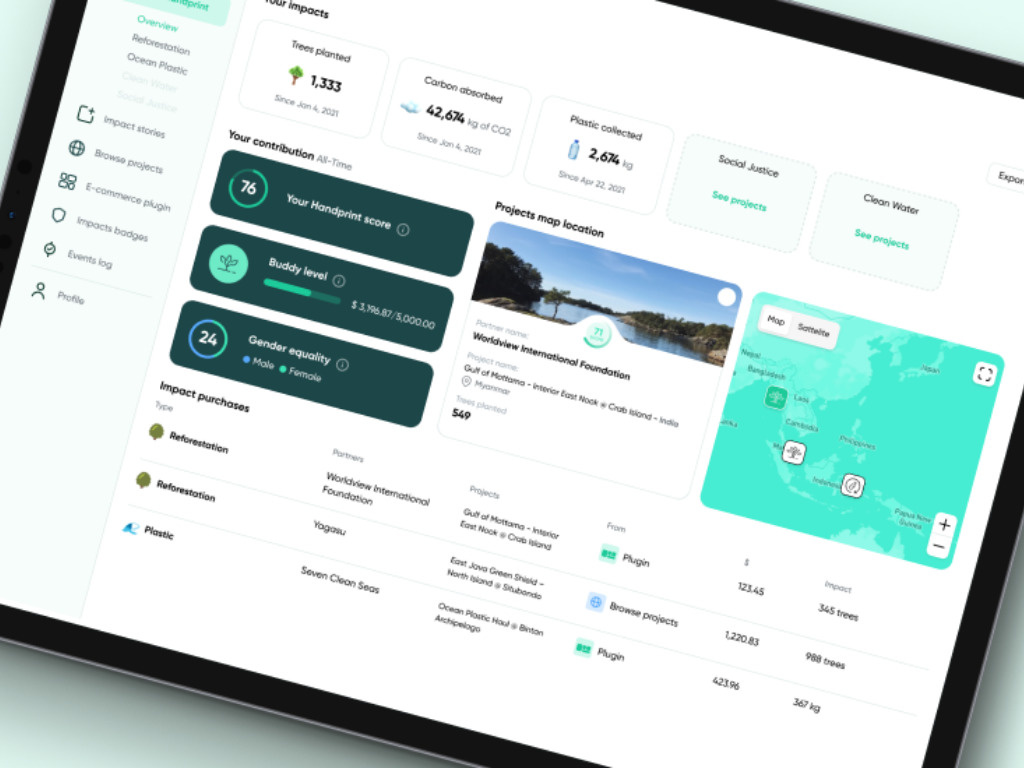This Singaporean Software Platform Wants To Make Sustainability An Unavoidable Integration For Global Businesses
5 Mins Read
Singaporean climate tech startup Handprint, which uses SaaS model to integrate sustainability-focused infrastructure into corporate platforms, has just closed a $2.2 million seed round as investors get more and more excited about impact assessment tools. The company’s ultimate aim is to offer businesses an easy way to improve their impact on the planet. Consumers are given access to positive initiatives that can be leveraged through their relationship with said businesses. The Handprint platform means corporate clients are able to choose a verified impact project to align with. This can then be incorporated into their services and tracked, over time, to asses long-term effects.
Handprint‘s round was led by payments network Thunes. A number of angel investors also participated. Investment is earmarked for technology development. The link with Thunes will allow for integrated payment solutions alongside, with hard-to-reach communities being able to benefit from the Handprint model.

How the platform works
Launched in 2020, Handprint is the brainchild of academics and engineers with a penchant for digital sustainability. It was designed to act as a seamless addition to existing corporate structures, thereby taking nothing away from functionality but adding responsibility.
The concept is relatively simple. Companies sign up, choose an impact project that is a natural fit with their focus and oversee the results. Projects can be embedded into various parts of a business model, including payment processing and e-commerce tools. Handprint claims that by using blockchain technology and, where appropriate, satellite imagery, it is able to reduce costs normally associated with impact projects. It has cited an 80 percent saving, which it says allows more money to reach beneficiaries. Handprint is clear that it does not manage any of the projects itself.
“Handprint onboards NGOs across a wide variety of impact types and geographies. We work with impact partners with deep local expertise and help them raise funds for the amazing work they do,” Mathias Boissonot, CEO at Handprint, told Green Queen. “As of yet, we do not manage projects directly, we do help our partners with guidance on how to monitor impact in the long run. On our side, we fully manage project set-up, monitoring & verification, and the impact service is managed by an impact partner, that can be an NGO or a social enterprise.”

Handprint in action
Positive impact can be leveraged in a variety of formats. So far, handprint has helped businesses to increase and improve their sustainability efforts. It claims that up to 75 percent of consumers look to engage with companies that are regenerative. Further, 85 percent of people believe companies have a responsibility to regenerate the planet. Handprint has positioned itself as a go-between for doing exactly this.
Successful integrations include tree planting linked to digital RSVPs for online events, advertising budget reallocation and consumer donations at checkout. For the most part, businesses pay for the Handprint model, though certain partners allow their customers to make direct contributions. The differentiation is made between those that buy impact services and the ones that integrate the tech into their own services.
What’s the USP?
The startup claims to set itself apart through transparency. It lays bare where money is distributed and offers verifiable environmental impact metrics, through a proprietary dashboard. The feature has been designed to facilitate easy report generation, accounting and impact tracking.
As a business, the Handprint platform naturally profits from its NGO onboarding service. Discussing how the platform makes money, Boissonot told Green Queen, “I love to answer that question because I think our business model is a USP and is quite disruptive compared to what exists in this space. Most competitors in the space buy impact (trees, carbon credits) and sell them at a significant margin (30-50%). Coming from the NGO world, we have decided from day one to maximize what goes to the NGO and only monetize our value-added layers.”
The layers incorporate three revenue structures: a monthly subscription to add web integrations, impact monitoring services and content creation for partner NGOs (generated using five percent of funds raised).

Tech for good on the rise
The increase in apps and web integrations focused on positive impact highlights the need for more ethical business models. Consumers are waking up to the power they hold and are starting to flex it by choosing to shop and engage with businesses they deem positively impactful. In a bid to support responsible consumption, developers are creating increasingly accessible interfaces.
Last month, Provenance, a London-based marketing tech startup, revealed it had closed a $5 million investment round. The funding will be used to further improve its platform that highlights brands’ sustainability credentials, at the point of sale. Users of the platform can search for companies and gain an understanding of how they offset their impact, what social projects they sponsor and understand the footprint of products being considered. It is part of the modern wave of ‘transparency tech’ seeking to educate and empower consumers.
A key driver for the sector, abillion, the vegan social app, has sought to encourage conversation and knowledge sharing about brands since 2018. Most recently, the platform announced it is offering users the opportunity to invest and own shares in the company. The move is cited as the ultimate democratisation of a social platform, designed to bolster community engagement and leverage brand reviews for positive social impact.




